Greetings blogreaders! I wanted to give you some quick updates and a few random thoughts for the week.
1. Biceps Tendon Tear
Five weeks ago I was doing conventional deadlifts with a mixed grip. I was having the workout of my life. I felt like the old Bishop in Caddyshack who was having the golfing performance of his life, only to get struck by lightning at the end of his game. I can always sumo deadlift around 20-25 lbs more than I can conventional deadlift, and the most I’d ever pulled conventionally was 545 (and 565 sumo). I was doing heavy singles, and started with 500. It went up easy. Then I moved up to 525. Cupcakes. Then 540, which seemed easier than 525. I moved up to 550 and right when I pulled it off the floor I heard a crunching noise and then a slight pop in my right elbow of the hand I had supinated.
I haven’t been able to really contract my right biceps since then, and an MRI confirmed that I have a major tear with barely any tendon fibers still connected to the bone. I’m awaiting surgery which should happen in the next few days. I’ll be in a sling for a couple of weeks, and apparently it takes six months to be back to normal.
Lessons learned:
- If you have a strong grip, consider using solely a double overhand deadlifts or even learn the hook grip.
- If you’re an athlete, consider using the trap bar as it doesn’t require a mixed grip. If you insist on pulling conventional or sumo and using a mixed grip, consider pulling with double overhands on warm up sets and only resorting to mixed grip when the weight gets too heavy for a double overhand grip. Consider using wrist straps on final heavy sets of deads and sticking with the double overhand style.
- Consider other stresses you’re putting on your biceps tendon. During the week the injury occurred, I had done supinated chinups, barbell curls, Zercher squats, mixed grip static barbell holds, and mixed grip deadlifts. That’s a lot of stress on the biceps tendon! No wonder it snapped!
- Once you start approaching your “genetic limit,” all strength training involves risk. You’re simply trying to take your body to places it doesn’t want to go. When athletes start huring themselves through heavy strength training consider moving to explosive work and heavy unilateral work.
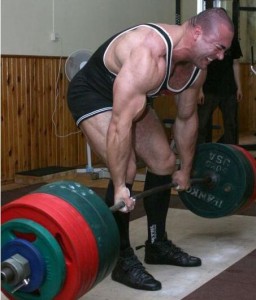
Many Deadlifters Pull Mixed Grip Year in, Year Out With No Problems. Just Know the Risks and Don’t Underestimate the Stress on the Supinated Arm During a Mixed Grip Deadlift!
2. Computer Trouble
In the past couple of months my computer troubles have been a nightmare. First, my computer started shutting down and restarting continuously. I took it in and they’ve returned it twice saying that it’s fixed, but it’s not. The same problem keeps happening. My laptop hasn’t been working for over two months and I’ve been having to use my computer at the University to get work done.
Second, I received a loaner computer from the University, but I haven’t been able to use it much as it took three weeks to get the internet installed at my new apartment. Then it took another few days to get the modem working properly as the unit kept restarting itself continuously. Finally technical support was able to help me fix the issue, and I have a reliable internet connection (but still no laptop – I had to give the University their loaner computer back and the computer company issued me a loaner but it doesn’t have MS Word on it!).
Third, I dropped my external hard drive and the data is unretrievable. Well, that is, unless I pony up $900 per hour for a forensics team to look (with no guarantee). So everything I’ve worked on for the past month is gone, and I did a ton of research!
Lessons learned:
- Always back up your work in several locations. You never know when things are going to crash.
- Go the extra mile and dish out whatever money is necessary in order to be productive. In the past couple of months it’s been a struggle as I hate feeling unproductive. Set yourself up to get work done. Had I known what would transpire I would have just bought a new computer!
- External hard drives are very fragile. Don’t drop them!
3. TNation Articles and Musclemag Articles
I have two TNation articles awaiting publishing. One of them I wrote with my friend Brad Schoenfeld and it’s about why bodybuilders are more jacked than powerlifters. The other I wrote with my friend Elsbeth Vaino and it contains everything you ever wanted to know about pushups.
I’ve written two articles for Musclemag – one on arm hypertrophy and the other on mass movements. I just saw a PDF of the article that will appear in July’s issue and it’s awesome! They go all out on these articles…the formatting and design work is incredible, and they have a professional photographer shoot pictures of a professional bodybuilder (in this case Jonnie Jackson). I love it!
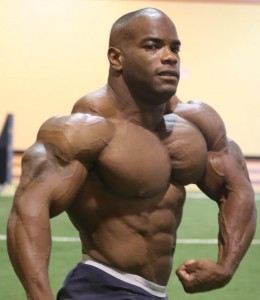
4. Journal Articles
By this time next year I should be listed on around five different journal articles. I’ve been collaborating like crazy with colleagues and we will have some excellent stuff to share with you in the future.
5. Trainer Trash Talk
Sometimes I get a kick out of our industry. There seems to be a lot of trainers jostling for position, with some trainers talking much more smack than other trainers.
In my first TNation article entitled “Dispelling the Glute Myth,” I talked a lot of trash and was overtly cocky. Since then I’ve tried to be more humble as the more I learn the more I realize that I don’t know jack shit! Sadly, most humans are simply too stupid to realize how little they know. I wrote a blog about this last year. Cockiness will win you fans, but these fans will abandon you when they learn that you don’t know it all and are overly confident about your intelligence.
6. “In the Trenches” Trainers
One of the common complaints I see from trainers is that trainers who are always “In the Trenches” are superior to trainers who are not always in the trenches. This is a pretty poor argument in my opinion.
Most of the “in the trenches” trainers suck. Go to any local gym and you’ll find a bunch of trainers who work around the clock and still don’t really know what they’re doing.
I got good at being a trainer by reading and watching videos. If I only learned from working with other clients, I’d suck as a trainer. If you shut out the rest of the world and spend your entire day as a trainer working with other clients, you don’t progress much. You spin your wheels. Sure, you learn from them, but at a very slow pace.
I choose to read and learn from experts from a variety of fields and this is what makes me a great trainer. I get to glean expertise that took them many years to develop.
You definitely need to be “in the trenches” and work with real people throughout your work week, but I venture to guess that many individuals who regularly read sites like TNation, Elitefts, Strengthcoach, and blogs of guys like Eric Cressey, Brad Schoenfeld, and Nick Tumminello, are much more educated than the typical personal trainer.
In addition to training others, you have to keep reading, watching videos, attending seminars, and talking to colleagues. Do you really think that Mel Siff accumulated all of his knowledge through training other people? Did Eric Cressey learn everything he knows about the shoulder joint by working with clients? Did Brad Schoenfeld learn about hypertrophy just through training people “in the trenches?” Did Nick Tumminello master the art of “joint-friendly training” without reading Physical Therapy books? Did I learn all I know about the glutes solely through training other individuals?
The answer to these questions are hell no! We learned through reading and studying and then applying the knowledge gained to our training. Some of the best fat loss, hypertrophy, and body composition gurus don’t work with that many real clients and have tons of online clients. This doesn’t mean that they’re less effective.
Don’t be one of those trainers or coaches who brags about being solely “in the trenches.” These types seem proud of the fact that they don’t read journal articles or other expert’s blogs, and their clients suffer as a result of their hubris. If you want to be the best trainer or coach possible, then you need to find ways to free up time so you can read more. As to what the optimal blend is – I’m not sure. An ideal day for me would be to train others for 4 hours per day, train myself for 1 hour per day, and study and read for 3 hours per day. Then of course there’s running errands, writing blogs, articles, and programs, and of course having a social life and spending time with family!
7. Sacrifice
As an extension from last point, if you want to be the best trainer or coach possible you’re going to have to sacrifice. In the past year I flew to Rode Island to attend the Perform Better 3-day seminar, took a graduate level Biomechanics course at ASU, visited with spinal expert Carl DeRosa in Flagstaff, visited with Olympic coach John Broz in Las Vegas, and sold my house and moved to New Zealand to get my PhD and be surrounded with other intelligent coaches. I’ve spent thousands of dollars and sacrified heavily to advance my career, and it’s become a way of life. Eventually it will pay off handsomely!
8. Sparticus
Some of my PhD buddies recently turned me onto a show called Sparticus.
To say that this show is badass is an understatement! Fight scenes, breasts, vulgarity, and gore, wrapped into a one hour show. I’ve only watched two episodes so far but I’m hooked! I’m starting to exclude pronouns from my vernacular in efforts to speak more like the Gladiator.
Peace out homies!

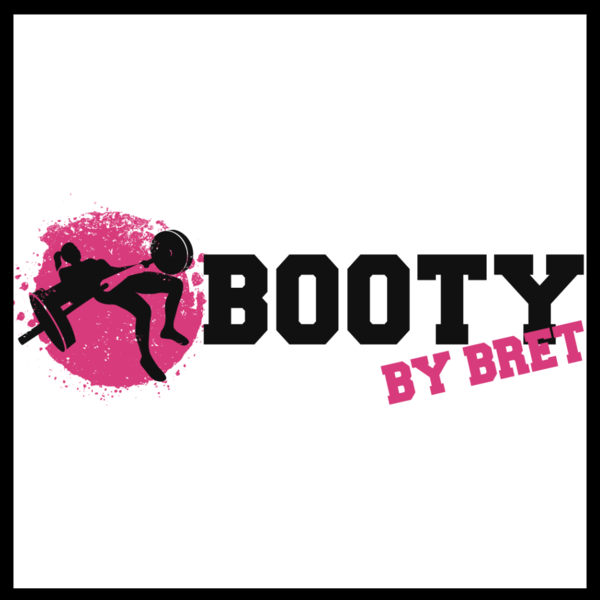
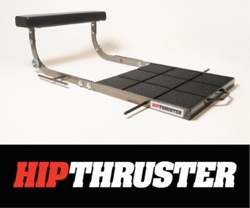
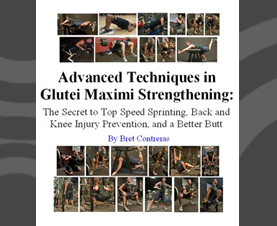
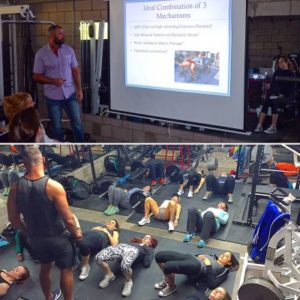
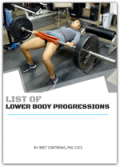
Bret – Sorry to hear about the bicep. Hope the surgery goes well and that you are back in the gym – doing slow, steady rehab in no time at all. Best wishes. Tom
Thanks Tom! I appreciate the kind words.
I really benefit from your work, I’m sorry to hear that you’ve suffered an injury. The upper ceilings on lifts for safety’s sake become harder to abide by as the poundages creep intoxicatingly higher, people don’t think of lifting as extreme sport but the risks as you point out are real. An article on overall routine balance as you near 300-600 pound loads on all lifts would be good, maybe there’s a volume/intensity/frequency formula that needs further respect.
Hope your operation an recovery is good, you’ll join the ranks of many strongmen with the ensuing battle stripe.
Spartacus rocks dude.
Dan
Thank you Dan. I agree. And I’m also amazed that I didn’t discover Spartacus sooner!
We’ve been ONLY pulling double overhand for about 4 years now. Ever since the Arnold I went to and saw the scars from Brad Gillingham’s double bicep tear. Hit the hook grip or straps.
I’m with Smitty!
And I’ll be the first to admit that I use straps with myself and my clients on heavy sets for just this reason. If a person isn’t aiming to be a powerlifter or compete in grip competitions I think that the mixed grip is unnecessary.
So it looks like Smitty, Jason Ferruggia, and Mark Young all knew I was bound to tear my biceps but no one said anything to me about it! 🙂
JK, it’s great that you guys came to this realization without requiring surgery. I was not so clairvoyent. And it’s great that you’ve been playing it safe with your clients – I’ve used the mixed grip with clients for years!
After some very annoying bicep tendonitis, I started gripping exclusively double overhand, and strapping once my grip failed. This was just something to make my training doable. I’m glad to hear there is some backing on this approach. Its also forcing me to dedicate time toward grip training to make sure I don’t lose strength from strapping.
Thanks for the tips!
Peter – one thing that was really helping my grip was to hold the top position of my heaviest set of deadlifts for a static hold for as long as I could hold onto it. I only did this for one set each workout and each week my grip was getting stronger. Of course there are plenty of other methods, but this didn’t require any extra exercises or setup.
ACK! Good luck healing that bi-tear.
As a sprinter, I realized I didn’t care that much about the upper body component of the deadlift… so when I started getting into bigger weights (450+ and I weigh 147), I switched to a trap bar and started using “Haulin’ Hooks”. Still a beast on the shoulders and traps, but not so much strain on the biceps.
Great intuition Steven!
So are you saying that when you wrote “Dispelling the Glute Myth”, you shouldn’t have been so cocky b/c “you didn’t know jack shit”? I personally loved the article, and the way you respectfully fielded every single question on the forums.
It does seem like you have gone from an outside the box thinker to another member of the club, which is not a bad thing as long as you keep your integrity. I hope you keep it real, Bret, even when you have to disagree with the “legends”, or your contemporaries.
I understand that this is your career, and career means getting paid. That’s usually where the trade-offs in life start happening.
And sorry to hear about your bicep. Sounds awful.
J-Dub, I’m not saying that I didn’t know jack shit about the glutes…I think I know more about the glutes than any strength coach, physio, or researcher. And I’m all for disagreeing with contemporaries, stating my opinions, and making my mark on the S&C world. Trust me, I’m not afraid to speak my mind!
The difference is that you don’t have to be overly cocky, or act like you know it all, or be overly disrespectful when you disagree. In the past I’ve started several blogs that I realized were going to be disrespectful and I ended up rewording them and saying the same thing without being rude. In the future I’ll have an article coming out that goes against what the entire industry is saying about a particular topic. Hope that makes sense.
Agree 100% about the “in the trenches” guys. It really frustrates me when they say they don’t do things in the research because they know what works with clients from being in the trenches. They don’t realise or flat out ignore the fact that the reason they recomend heavy back squats at certain rep/set schemes is because there was once a study done that showed this was optimal for strength/power/testosterone release etc. Similarly i have seen several coaches recently talking down about people that quote research, only to write an article/blog post the very next day quoting research.
Should someone be 100% research, no. Should someone ignore all research and be 100% “in the trenches”, no. Blend the two and be a better coach for it. Just understand the research your reading (maybe by buying Mark youngs product!) and don’t allow yourself to be restricted by the research to the point that your programs lack creativity. Good luck with the bicep op Bret!
Rhys
Exactly Rhys! That’s what I’m talkin’ bout.
Hey Bret. Ask them to hook it back up an inch or two further down the arm. They used to do it in the soviet era to make them hella strong!! Imagine the shit you could do with bioengineered guns!!!
Dean,
From my (somewhat limited) knowledge of that practice, the results didn’t match the theory.
They tried re-attaching muscles to the point of biomechanical advantage, but neuromuscularly things didn’t work out so well.
Get well soon!
(And, of course tell us what you did, and if you Krok-ed it)
And thanks for the warning.
Vlad
Thanks Vlad!
Great stuff with the “in the trenches.” It does seem to be an annoying trend with coaches that they feel they will learn all they need to know from just doing it. I always thought of it as I’m taking someone else’s knowledge adding it to mine then growing beyond the path they already made rather than trying to do the same thing they did.
Also, the point on sacrificing things. I forget where I read it but someone went on a rant about how if you enjoy what you are doing you are sacrificing anything. I always thought I sacrificed my social life and friends to become a better coach but really I enjoy coaching more than a night out at the bar. One afternoon at nationals was way beyond any drunken night out with my friends.
Love your stuff.
I like the way you think Jeff!
Sorry to hear about the injury, rest well & heal fast!
Thanks Jonathan, I will!
Good luck with the surgery Bret! 1 arm dead’s post surgery!? 🙂
Actually I’ve been doing 2 arm deads – double overs and mixed grip (the other way) haha! We meatheads are very dense 🙂
-Great points on the cumulative effect of training.
-Great point about trash talking and those who think they have all the answers. I’ll post stuff in forums not to be a contrarian but to try to inspire people to think for themselves and realize the coach with the forum or blog is just presenting what works for him. It is not gospel. There is optimal from a business standpoint and optimal from a training standpoint and the two aren’t one in the same.
Preaching to the choir on that one Rich!!!
For writing I would use Google Docs, which is free and can be used inside your web browser.
For data retrieval from your damaged hard drive I would try a product called Spinrite – http://www.grc.com/sr/spinrite.htm
which repairs and recovers data from damaged hard drives. It is a good program and much less expensive than taking it to a forensic place.
Thank you Laoch!!! You rock.
I’ve always thought we need to spend more time worrying about the ideas themselves and less about the men (or women) behind them. A good idea can come from anyone at anytime, regardless of experience, training age, or how much time they’ve spent in a trench. Anytime I’ve seen the ‘in the trenches’ post come up on a blog it’s usually just a lame marketing attempt in disguise, the writer just trying to indirectly plug their experience. Glad to see I’m not the only one that has noticed.
Best of luck in your recovery.
Dan, I wrote about that in my glute eBook – there are experts (classically trained folks) and inperts (those trained in other fields who quite often venture into other fields and come up with brilliant discoveries).
Bret,
I’m a little curious to what you mean by “It will pay off eventually”?
I see what you are doing as the end in itself, not some means to something that may or may not eventuate (and if it does, will you want it then anyway?)…the whole it’s the journey not the destination thing.
Nick, one day I’d like to be able to retire, relax, smell the roses, etc. Right now I’m happy to work like a dog but I won’t be this way forever! Personally I’ve never liked the journey – I’m a destination guy! I need to work on that as I’m so impatient. Good thoughts!
Hi Bret
Really sorry to hear of all your problems. I have gone through the same thing with losing research with computer failure. I have many external hard drives fail on me for no obvious reason you don’t have to drop them.
Sorry to hear about the bicep tendon as well it sounds horrible. It has prompted me to ask you some questions about deadlifting and lower body training that I have been thinking about. I have taken up dead lifting largely inspired by people like yourself. I go to the gym alone and in the two gyms that I frequent I don’t see anyone else deadlifting so I am completely self taught, your writing and videos on the subject are really valuable. So one question I had is how dangerous is deadlifting and how much should someone who is training alone push themselves?
Bit of background, I am 52 y 6ft 4in ~ 195 lb. I have 3 knee operations, 2 complete medial meniscectomies (ie left and right knees) ~ 30y ago and a ACL repair in rt leg 10 y ago. My lft knee started causing me discomfort 1 y ago and I was told the ends of the bone (where there is no meniscus) are inflamed and so I am guessing this is the start of osteoarthritis. I asked what I should and shouldn’t do and I was told that I should avoid squatting but that it was ok to play tennis and badminton. Seemed strange to me as the stopping/starting and twisting from tennis and badminton would more likely to cause problems, what do you think? Anyway this is one of the main reasons I started deadlifting.
For quad training I generally do step ups and lunges but not with much weight because I am worried that if get sudden pain in my knee (has happened) it would cause me to drop the weight or worse etc. I know many people have a downer on the leg press but I was thinking for someone like me it may be an acceptable alternative to squatting. I would really like to hear your thoughts if you have time.
Thanks in advance.
Mark Roberts
Mark, I recommend the RDL, hip thrust, and weighted back extension, as well as the high foot placement leg press if you have access to it. Your glutes and hammies will be strong as hell and you’ll spare your knees.
Dang man sorry to hear about the biceps tendon! I ruptured mine a couple years back playing football. The first Dr went in planning on simply reattaching it but when he got in there he said it was shredded and he couldn’t even find anything to attach. I then had to go to a specialist and he was able to find enough to attach a cadaver tendon to. My arm is a little funky looking and I switched my repaired arm to the overhand grip and the other to the prone grip. It took some getting used to but my deadlift is the best it’s ever been. But I totally agree with you about laying off a lot of the other lifts and give your bicep tendon a break!! again best of luck to you in your recovery!!